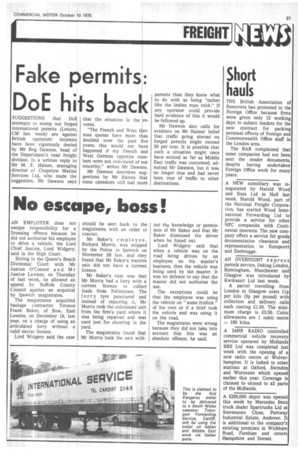No escape, boss!
Page 29

If you've noticed an error in this article please click here to report it so we can fix it.
AN EMPLOYER does not escape responsibility for a licensing offence because he did not authorise his employee to drive a vehicle, the Lord Chief Justice, Lord Widgery, said in the High Court.
Sitting in the Queen's Bench Divisional Court with Mr Justice O'Connor and M r Justice Lawson, on Thursday of last week, he allowed an appeal by Suffolk County Council against an acquittal by Ipswich magistrates.
The magistrates acquitted haulage contractor Terence Frank Baker, of Bow, East London, on December 19, last year, on a charge of using an articulated lorry without a valid excise licence.
Lord Widgery said the case should be sent back to the magistrates with an order to convict.
Mr Baker's employee, Richard Morris, was stopped by the Police in Ipswich on November 26 last, and they found that Mr Baker's tractive unit did not have a current licence.
Mr Baker's case was that Mr Morris had a lorry with a current licence to collect loads from Felixstowe. The 1 or r y tyre punctured and instead of repairing it, Mr Morris took the unlicensed unit from the firm's yard where it was being repaired and was used just for shunting in the yard.
The magistrates found that Mr Morris took the unit with out the knowledge or permission of Mr Baker and that Mr Baker dismissed the driver when he found out.
Lord Widgery said that when a vehicle was on the road being driven by an employee on his master's business, then the vehicle was being used by the master. It was no defence to say that the master did not authorise the use.
The exceptions could be that the employee was using the vehicle on "some frollick " of his own or if a thief took the vehicle and was using it on the road.
The magistrates were wrong because they did not take into account that this was an absolute offence, he said.




































































































































